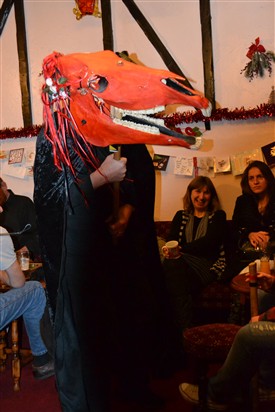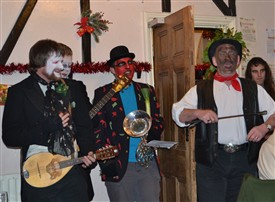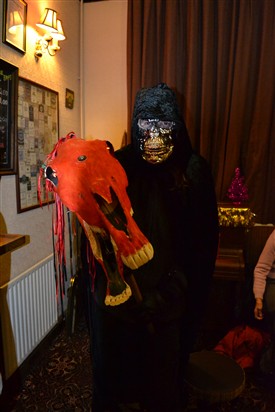This is my poor old horse...The Poor Owd Oss of Nottinghamshire

The Poor Old Oss
RBParish

The Company of Owd Oss 2012
RBParish

Close up of the Rider
RBParish
A December custom
By R B Parish
In private houses and later inns and pubs from the mid 1800s onwards, Christmas Eve would be associated with the Poor Owd Oss or Old Horse. The tradition was a type of mummer’s play although mostly sung rather than acted. Its arrival was deemed to be associated with luck and as such it was rarely sent away, although it appears the custom was primarily done as a way of making drinking money, mainly by miners, on the Nottingham-Derbyshire-Yorkshire borders.
The Owd Oss or Old Horse consisting of a painted horse’s skull on a stick which was often set up for it to snap shut. The play itself describes a worn out horse. Mayfield (1976) in his Legends of Nottinghamshire records a rendition done in the Mansfield area, but records show it was undertaken widely across the county. Although called a mummer’s play it contains the least amount of dialogue and is mainly sung. A report of the custom notes:
“A group of men would enter a pub or house and after reciting three verses of a prologue, would bring in Owd Oss which consisted of a man draped in a dark cloth with a carved horse’s head fastened to a stick.”
Poor Owd Oss appears to have been common in Mansfield until the 1870s. In Carlton it survived until 1907. In Cuckney it died out by 1914, although there is record in 1921 for the children of the village at school party. It appears to have lasted longer on the Sheffield borders however, according to SFRN Miscellany a Ruaridh and Malvina Greg recorded it still being undertaken in Dore in the 1970s. Mason (1902) immortalised the script, which begun with a prologue:
“By leave, you gentlemen all, Your pardon I do crave, For making bold to come, To see what sport you’ll have. There’s more in company, They’re following close behind; They’ve sent us on before, Admittance for to find. These blades they are but young; Never acted here before; They’ll do the best they can, And the best can do no more.”
At this point the Old Oss arrives, the music is started and the introducer starts the main part of the song. As he does so the Oss parades through the crowd causing mischief:
“This is my poor old horse, that has carried me many a mile, Over hedges, over ditches, over high-barred gate and stile; But now he has grown old, and his nature does decay, He's forced to snap at the shortest grass that grows along the way;”
At the end of each verse the crowd would cry:
“Poor old horse! Poor old horse!”
The song would those continue with the crowd crying out the final refrain each time:
“His coat it was once of the linsey-woolsey fine, His mane it grew at length, and his body it did shine, His pretty little shoulders that were so plump and round, They're both worn out and aged; I'm afraid he is not sound; Poor old horse! Poor old horse!
His keep it was once of the best of corn and hay, That ever grew in cornfields, or in the meadows gay; But now into the open fields he is obliged to go,
To stand all sorts of weather, either rain, or frost, or snow; Poor old horse! Poor old horse!
His hide unto the tanner I will so freely give; His body to the dogs; I would rather him die than live: So we'll hang him, whip him, strip him, and a-hunting let him go; He's neither fit to ride upon, or in the team to draw;
Poor old horse! Poor old horse!”
The number of versions differed, changing according to location. In Mayfield’s version, the play ends with a blacksmith was called upon and he would chase the Oss around stating that:
“ Rough music invariably followed the blacksmith’s attempt to shoe the horse, while the rest of the company played their parts.”
Another common feature, as Mayfield (1976) notes:
“Then drinks were called for and the question was put could the Owd Oss manage to drink? The jaws of the horse were so arranged that a bear glass could be inserted and the moment of truth-and achievement- for the player performing the Owd Oss depending on the ability to take his drink without removing a scrap of his gruesome equipment.”
How old the tradition is, is unclear, it is first noticed in the 1840s and may be no older than that, although why a custom would arise in this rather insignificant period is not clear. Equally it may be that this is a period with a growth of antiquarian interest, particularly of the more academic kind, so it may happen just to be recorded then, as were other similar folk customs. Therefore, it may be considerably older and related to similar customs such as the Cheshire Souler’s play. Perhaps the record of a hobby horse at Holme Pierrepont may recall this custom but that is mere supposition.
"It could have arisen in the post-Industrial period as something to do with the skulls of pit ponies to raise some money".
It is also tempting to link the custom with the view of Archbishop of Canterbury Theodore in the 7th century Liber Poenitentialis who complained about tribes dressing in animal skins at the Kalends of January (the 1st) stating:
“whoever at the calends of January goeth about as a stag or bull; that is, making a himself into a wild animal and dressing in the skin of a herd animal, putting on the heads of the beast, whose who in such wise transform themselves into the appearance of a wild animal, penance for three years because this is devilish.”
Perhaps the Poor Owd Oss is a survival of this Winter solstice observation with this custom being a continuation of a form of pagan animal worship. However, it could have equally arisen in the Industrial period as a response with something to do with the skulls of pit ponies to raise some money.
It appears that in most places the play died out just after the 1940s, although it was revived Richmond, Yorkshire on Christmas Eve, and the version there bears more relation to hunting. Nottinghamshire’s tradition was more working class in its approach. In Nottinghamshire, it was revived by the Company of Owd Oss, part of the Black Pig Morris in 2005 in the Kimberley area. At first the Oss consisted of a papier-mâché skull, then one made of railway sleepers and finally a real horse’s skull. This skull is painted red, has LED eyes and other lights. Unlike the first skull this structure does not open and close its jaw - which is a shame. All skulls are attached to a pole and carried by a man cloaked and wearing a silver death mask. The reviver of this custom was Dave Mooney who informed me that he came across the custom whilst idly reading a book on traditions in bed! That year, after the discovery of the above script recorded by Mason in 1902 and information that is was done in Kimberley, with some musician friends and Morris men revived it. They custom is only undertaken one night, usually the week before Christmas and involves visiting local pubs usually three or four a night, including in Nottinghamshire, Giltbrook, Bagthorpe, Swingate, Watnall, and Kimberley. As far as I am aware they are the only group in Nottinghamshire to enact this play and long may it continue and possibly encourage other revivals.
References:
Anon, (1984) 'Festival revival for Poor Owd Oss custom' Mansfield Chronicle & Advertiser 5th Jan 1984 no 5857 new series p5 e-f
Buxton, A. S., (undated) The Christmas Play of the Poor Owd Oss. Buff notebook pp33A-42
Cawte, E C, (1978) Ritual Animal Disguise (DS Brewer for the folklore society)
Howes, B., (2005) Folk Plays – Winter 2005/2006 'Company of Owd Oss'
Mason, M. H., (1902) Nursery Rhymes and Country Songs: Both Tunes and words from Tradition.
Mayfield, P., (1976) Legends of Nottinghamshire
Ramsden, R., (1922) 'Christmas Old Tup and Old’ Oss Plays from Carlton Notts'. E.L.Guildford collection 31st July 1022 M99 11/1 an 2
SFRN Miscellany 'Luck-visiting in the Old South Riding of Yorkshire'
Pers comm . Dave Mooney Company of Owd Oss/Black Pig Morris